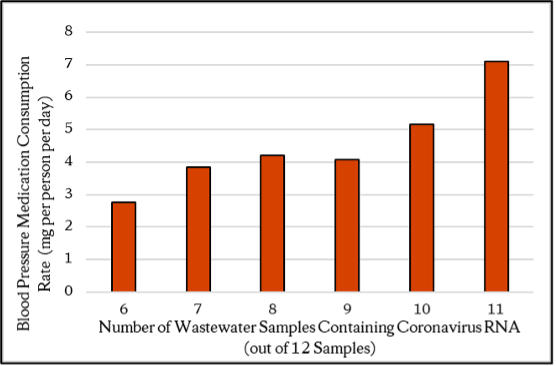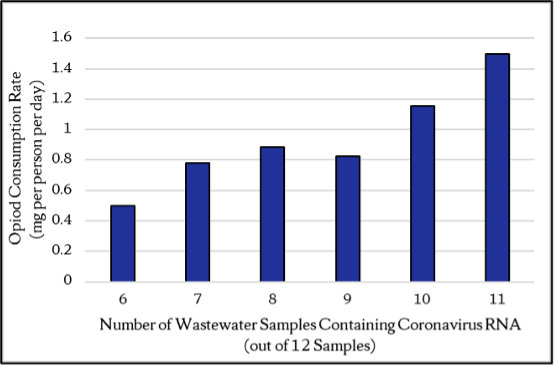Reported by Kerrie Marshall, Arik Palileo, Eric A. Schiff, and Teng Zeng
DOWNLOAD THE BRIEF [PDF]
View SyracuseCoE’s other research briefs
Summary:
Wastewater testing is increasingly used worldwide to monitor trends in pharmaceutical and illicit drug use. Between April and July of 2020, wastewater samples from six sewer systems in Onondaga County, NY were tested to assess pharmaceutical and illicit drug use patterns during the COVID-19 pandemic. The study found that samples from sewersheds showing greater pharmaceutical and illicit drug use also contained more SARS-CoV-2 RNA – the genetic material found in the coronavirus. Testing identified higher levels of 26 pharmaceuticals, including medications for depression, epilepsy, allergies, and high blood pressure, as well as illicit drugs like opioids, cocaine, and amphetamines. For example, Figure 1 illustrates greater blood pressure medication consumption (left panel) and greater opioid consumption (right panel) in locations with wastewater samples containing coronavirus RNA. For all six substance groups (antidepressants, antiepileptics, antihistamines, antihypertensives, synthetic opioids, and central nervous system stimulants), the sewersheds with the lowest consumption rates had an average COVID-19 positivity rate of 1.5% – 2.5%, while the sewershed with highest consumption rates had a COVID-19 positively rate of 4%. This study demonstrates the need to establish regional and national wastewater testing initiatives to monitor COVID-19 spread and its implications for prescription and illicit drug use.


Note: Each bar represents a different sewershed in Onondaga County, NY.
References:
About the Authors
Kerrie Marshall (klmarsha@syr.edu) is the Assistant Director of Communications at SyracuseCoE, the SU Center of Excellence in Environmental & Energy Systems. Arik Palileo (apalileo@syr.edu) is a SyracuseCoE Communications Intern. Eric Schiff (easchiff@syr.edu) is the Interim Executive Director of SyracuseCoE. Teng Zeng (tezeng@syr.edu) is Assistant Professor of Civil and Environmental Engineering at SU, a SyracuseCoE Faculty Fellow and the lead author on this study.
